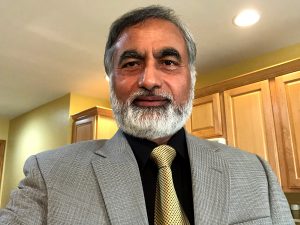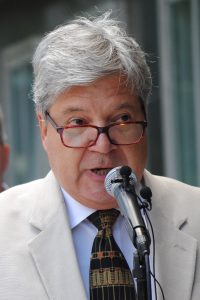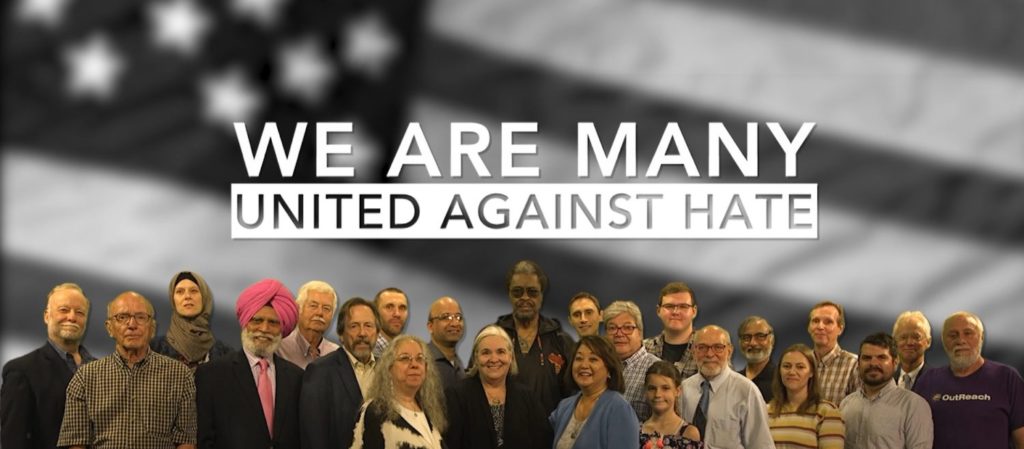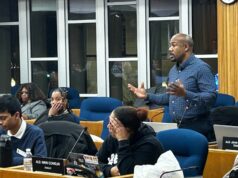In the wake of the domestic terrorist attacks in El Paso and Dayton that killed dozens of innocent people earlier this month, “We Are Many: United Against Hate” founder Masood Akhtar has been seeking locally based answers to the questions raised by these national tragedies propelled by hate.
“People are very concerned about what they are seeing. Anything that happens nationally or internationally affects people living in Wisconsin,” Akhtar says. “And if you look at just this year, over 250 mass shootings (those with four or more fatalities) have occurred nationwide. The question we’re all asking, particularly those of us in Muslim communities, is ‘who are these shooters?’ And the answer is not someone associated with al-Qaeda or an ISIS ideology. Are these people from the countries that the president has banned, or from the immigrant and or refugee groups he targets? The answer is a resounding no. The answer is homegrown domestic terrorists.”
Akhtar cites as evidence the recent testimony of the current FBI chief in illuminating the growing phenomenon of white supremacism as one of the nation’s greatest challenges to its security.

It’s the economic challenges facing all too many people in this country that are creating a growing economic divide that is behind much of the current discord, and this becomes a pretext for young white supremacists seeking someone to blame, Akhtar believes. United Against Hate has responded with a new project, designed to offer educational opportunities through loans and mentoring relationships as a means of response. The new student loan fund reaches young people who might not be eligible for other programs, and is designed to replace their anger and fear with hope for a better life in an effort to build an inclusive community.
The program exists alongside other United Against Hate initiatives to promote positive community dialogues, and to mediate conflicts. One high-profile effort involved the community of Baraboo, following a controversy that followed the online posting of a photo of high school young men with hands in the air in what appeared to be Nazi power salutes.
The incident was seen as an educable moment — with lessons applicable to both small towns and major cities throughout Wisconsin. Akhtar brought Pardeep Singh Kaleka and Arno Michaelis to town to lead discussions among the affected youth. Kaleka’s father had perished in the Oak Creek Sikh Temple gun massacre seven years before, and Michaelis was a reformed white supremacist whose former hate group had killed six people at the temple. Together, the two men are now working to bring people together, and to draw people out of white supremacism and the all-too-pervasive mindset that underlies it. It was a message of reconciliation that resonated strongly with all who heard it.
Last week, Akhtar returned to Baraboo to help shepherd in a new community alliance that, a year after the incident, is charting the path forward.
Americans have a far greater chance of being attacked by homegrown extremist white supremacists than by any foreign threat, notes Nino Amato, United Against Hate’s policy committee chair. “The odds at least 100 times greater…. despite what our illegitimate, fear-mongering president might say,” he says. “He attacked the Muslims, and he attacked the Mexicans. He called every African country s**t-countries. And the point is, Trump is systematically, hatefully, going after every community he disagrees with.”

There are very real reasons for people to be scared, but not because of the largely manufactured potential threat from foreigners or recent immigrants. The same people who Trump and his allies have targeted in invoking fear of “the other” are often the people with a very real reason for fear.
“And what’s tragic is that its children who are frightened —children who are frightened because of what it means to be Hispanic or Muslim in the schools, and people of color are scared,” Amato observes. “This is really serious. Last year alone, the FBI investigated over 850 cases of domestic terrorism. And this is beginning to snowball, and it’s only made worse by a GOP leadership that is standing silent and not condemning what’s really going on.”
Amato cites the gun industry’s short-sighted philosophy of putting profits over people, and how that has played out in our political life for far too long.
“And it also comes down to following the money. Do guns kill people or do people kill people? Guns do kill people, and we can’t even get background checks passed through Congress,” Amato says. “And why? Follow the money, for example, the million dollars that [Kentucky Sen.] Mitch McConnell received from the NRA, and Senator [Linsdey] Graham received over $800,000.”
Efforts to blame the carnage on video games or the mentally ill rather than the prevalence of the weapons of war are largely NRA talking points, he adds.
“It should not be a partisan issue,” he says. “And several Republicans are now stepping forward to advance red flag laws that would allow due process for the authorities to go in and take weapons away from disturbed individuals.
“The terms being used… invasion, infestation… these are the same terms that fascists and communists used to demean human beings by characterizing them as vermin, and you’ve got these young minds who buy into this, and it translates into violent actions,” he continues. “We have the same kind of crisis that we’ve seen historically. This administration is using fear, and inciting right-wing terrorists who quote the president on their websites. He may not be directly guilty, but Donald Trump has blood on his hands.”
We Are Many – United Against Hate has a large advisory board, and is growing stronger with each day. Akhtar’s engagement with these issues began in 2016 when he received a call from a local TV station, asking about his response to a Trump proposal to create a Muslim registry.

“My response was to point out that I’d come to this country 35 years ago, given up my Indian citizenship, and become a proud American Muslim, because I believed in this country,” he says. “I knew then and I know now that singling out an individual on the basis of their religion is Un-American and unconstitutional.”
Akhtar created his own registry of people willing to take a stance against any such efforts to single people out on the basis of their country of origin or religion. Such were the seeds of a group that soon became “We Are Many United Against Hate,” a group that has since grown by leaps and bounds in every corner of Wisconsin, and which now may be poised to expand nationwide.
“We want to have a positive impact on public policies, and we want to continue to get out into Wisconsin communities,” says Amato. “I’m cautiously optimistic. I say that because we’ve been here before. A hundred years ago, the political corruption in this country was horrendous, and then the populists turned it around. But the biggest danger is silence. If you’re angry or upset, don’t leave for Canada. Don’t bury your head in the sand. Come join us!”
“I’ve said it before and I’m going to say it again,” Akhtar adds, emphatically. “Despite all of these things that we are seeing nationally, America is still the best country on the face of this earth in which to practice your religion and to seek the fulfillment of your dreams. And the only way we’re going to keep going moving forward is to make sure that this country remains the model for the world to follow. I’m optimistic that — working together— we will be successful.”


































